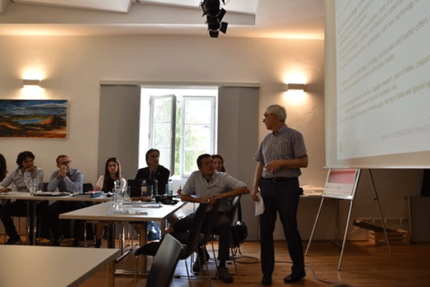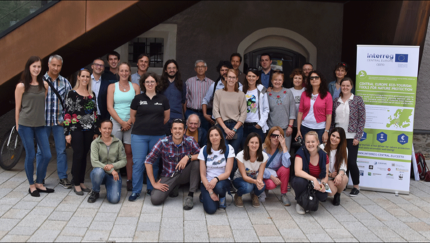2nd CEETO Technical meeting takes place in Lungau, Austria
The workshop hosted by the UNESCO Biosphere Reserve Salzburger Lungau was an opportunity for project partners and park technicians to learn more on participatory processes, define their objectives and deepen in the use of tools for the implementation of CEETO project pilot actions.
CEETO project entered into the implementation phase of Work Package T2 “Testing” with the preparatory workshop on participatory planning on sustainable tourism in Protected Areas. During the workshop, which took place in Tamsweg (Austria) last 4th-5th June hosted by the Biosphere Reserve Lungau, project partners and Parks technicians of the 8 pilot areas have learned a methodology and approach to participatory processes, and have better defined the objectives, deepened the useful tools to accompany the future choices and the implementation of the 8 pilot actions at local level in Austria, Croatia, Germany, Italy and Slovenia.
In fact, the overall main goal of the WP T2 is to test a model of governance of tourism flows within the 8 pilot Protected Areas aimed at reducing environmental impacts and pressures of tourism and enhance the socio-economic benefits that can come from a sustainable tourism approach. Starting from the features of each Pilot Areas (existing pressures and governing structures), it is therefore developed a process with this first part common to all Protected Areas (capacity building + participatory process) aimed at elaborating the Sustainable Tourism Action Plans, and then a local implementation of specific managing and monitoring tools defined in the single Action Plans through 8 pilot actions.

CEETO participatory planning workshop - Photo by EUROPARC Federation
A Capacity Building Workplan has been produced to support the Protected Areas managing bodies in the implementation of such model and will allow the managers of each Protected Area to define their own tailored participatory planning process, according to their specific context, level of local stakeholders involvement and tourism monitoring needs and priorities. Participatory Mapping is used to define the most precious/valuable areas to preserve and promote in the Protected Area, the most vulnerable areas endangered by tourism pressure, the most relevant tourism flows that cross the Protected Area.
During the Workshop was tested the World Cafe methodology designed to create a collaborative environment to develop concrete actions and initiatives from multiple ideas coming from different stakeholders. In fact, World Cafe combines interactions between stakeholders and multiple focus groups on different thematics and topics. So that scientific, technical and community knowledge are committed to the same goal.

Participatory planning workshop
Three World Café tables discussed the most appropriate tools to increase tourists' awareness, identify the categories of stakeholders to be involved in the participatory process and see examples of how other protected areas have faced their problems and found solutions. The conclusions of the workshop also discussed the correct approach towards participatory planning and how to carry out a correct assessment before starting the implementation of the process in the framework of CEETO Project; and how to design an incisive, effective and time-saving participatory planning process.
The next phase of WP T2 “Testing” foresees various Workshops on The Spot, and pilot actions, in particular surveys and monitoring actions. CEETO Project Partners will try to exploit as much as possible the two summer seasons and obtain the greatest quantity of information (both quantitative and qualitative) on the starting conditions and on the variations.
Finally, the workshop demonstrated once again that the collaboration between Project Partners is fundamental and that exchanges of information and ideas can bring really and practically benefits for everyone, simplifying the work and finding clever solutions that Project Partners can adapt to their cases and local context.
